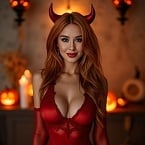Halloween as a Way to Confront Fears
The psychology of Halloween is intriguing because it allows people to express and experience their hidden fears by engaging with the supernatural, mystical, and sometimes creepy. It provides an opportunity to confront emotions and imagery that typically cause anxiety—but in a safe, playful setting. It's similar to watching horror movies: from the comfort of our cozy rooms, we get to feel emotions that we rarely encounter in everyday life, such as deep disgust or mystical awe.
Halloween offers liberation from fear through play. 🤩
Celebrating Halloween lets people explore themes of death, monsters, and other scary subjects within a controlled environment. This reduces anxiety, especially for children, who can dress up as frightening characters and symbolically “master” them. 😈 Throughout history, humans have felt a mystical fear of the unknown, but holidays like this allow us to tame those fears by approaching them with humor and experiencing them safely. Additionally, Halloween fosters a sense of community, uniting people through shared fear. At a costume party, we meet others who’ve transformed into versions of what scares them most. 😱
Halloween as a Way to Explore the “Dark Side” 👻
Halloween offers a chance for people to express what normally stays hidden. Choosing a spooky costume—whether a monster or villain—allows individuals to symbolically act out darker or repressed aspects of themselves, promoting inner integration. For example, wearing a vampire costume can help channel repressed anger or express sexuality. Similarly, dressing as the “Corpse Bride” from Tim Burton’s film helps people confront the unsettling concept of death. 💀
Halloween as an Outlet for Imagination and Archetypes 😍
Costumes and makeup create a space for creative freedom and archetypal exploration. Characters like witches, vampires, and zombies reflect cultural and psychological fears, but playing with these images can reduce their psychological impact. Additionally, crafting costumes and makeup encourages people to tap into their creative potential—whether for personal enjoyment or to compete in costume contests, which inspire us to push our imaginations. 😊
Social Permission to Break the Rules 😏
Halloween gives people permission to step outside societal norms, wearing unconventional clothing or behaving in unexpected ways. This holiday helps individuals relax their internal controls, express hidden desires, and experience a sense of freedom. For many, it’s the perfect opportunity to shed the “masks” they wear daily and adopt a different role. That’s why today’s Halloween parties feature not only scary characters like witches, vampires, and mummies but also beloved figures from movies, books, and comics. 📚
A Collective Play with Death and the Unknown
Through ghostly imagery and death-themed characters, Halloween reminds us of our mortality, encouraging reflection on the value of life and the importance of living each moment to the fullest. It’s a symbolic “play with death” that helps reduce fear by offering a new perspective on it. Many cultures, including our own, have traditions of dressing up in costumes, but Halloween uniquely emphasizes mystical experiences and taboo topics like death.
The Thrill of “Pleasant Fear” 🤩
As I mentioned earlier, celebrating Halloween, like watching horror movies, brings a sense of “pleasant fear.” Encountering fear in a safe environment triggers a rush of adrenaline and endorphins, leading to an exhilarating sensation—this psychological phenomenon is known as “pleasant fear.” 😨
In conclusion, Halloween is not just an entertaining holiday but also a therapeutic one. It provides a safe space for people to explore their fears, release suppressed emotions, and experiment with aspects of their personality that rarely surface in everyday life. 😌
Quick Search

Prices & Services
Letters from 2$
Fast Gift Delivery
2-way Video Chat
5 Membership Levels
View all rates
